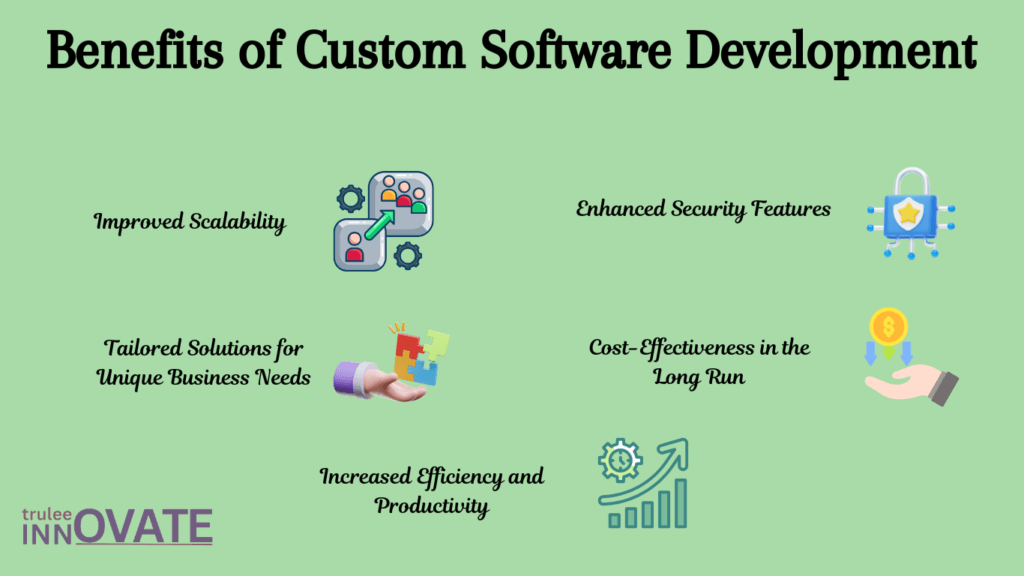Introduction: Understanding Custom Software Development
In today’s fast-paced digital world, businesses are continuously adapting to ever-changing market demands and consumer expectations. To remain competitive, organizations must embrace innovative solutions that streamline operations and enhance customer experiences. Custom software development stands out as a pivotal approach, offering tailored solutions that address specific business needs. Unlike off-the-shelf software, custom software is designed and developed to align seamlessly with a company’s processes, goals, and challenges.
This blog explores the benefits of custom software development and explains why it is a transformative strategy for businesses across industries.
What is Custom Software Development?
Custom software development refers to the process of designing, building, deploying, and maintaining software specifically tailored to meet the unique requirements of a business or organization. Unlike generic software that caters to a broad audience, custom software focuses solely on your company’s needs, making it highly personalized and functional.
This approach typically involves collaborating with skilled developers, project managers, and stakeholders to create a solution that supports operational efficiency, scalability, and innovation.
The Key Features of Custom Software Development
Before diving into the advantages, let’s look at the core features that make custom software a superior choice:
Tailored Functionality: Custom software is made to fit your unique goals and workflows.
Scalability: The software can grow and adapt to your business as it expands, ensuring longevity.
Integration Capabilities: Custom software can seamlessly integrate with your existing tools and systems.
Enhanced Security: Custom-built solutions incorporate advanced security measures tailored to your business environment.
Support and Maintenance: Developers offer personalized support and updates for your software.
The Top Benefits of Custom Software Development for Businesses
1. Improved Scalability
One of the most significant benefits of custom software development is its ability to scale alongside your business. Off-the-shelf solutions often struggle to accommodate growth, leading to inefficiencies and bottlenecks. Custom software, however, can be enhanced and updated to match the changing size and complexity of your operations.
For example, as your customer base grows, custom software can incorporate features like advanced data analytics, automated customer support, and additional user interfaces to handle increased demand. This scalability ensures your software investment remains valuable over time.
2. Tailored Solutions for Unique Business Needs
Every business has unique workflows, goals, and challenges. Off-the-shelf software might force you to adapt your processes to fit its capabilities, which can result in inefficiencies. Custom software development eliminates this issue by providing solutions specifically designed for your organization.
Whether you need a system to manage inventory, track employee performance, or improve customer engagement, custom software delivers exactly what you need without unnecessary features or limitations.
3.Enhanced Security Features
Data breaches and cyberattacks are growing concerns for businesses in every industry. Generic software solutions are more vulnerable to hacking because their widely-used structures make them predictable. Custom software, on the other hand, incorporates security features specifically designed for your organization, making it much harder for attackers to exploit vulnerabilities.
For industries dealing with sensitive data, such as healthcare and finance, custom software provides the robust protection needed to safeguard critical information.
4. Increased Efficiency and Productivity
Custom software streamlines processes by automating repetitive tasks and eliminating inefficiencies in workflows. Employees can focus on high-value activities rather than wasting time on manual tasks or navigating complex, one-size-fits-all software.
For instance, a custom customer relationship management (CRM) system can automate lead tracking, email follow-ups, and sales reporting, enabling your sales team to close deals faster and more effectively.
5. Cost-Effectiveness in the Long Run
In the long term, custom software creation is frequently more cost-effective than buying off-the-shelf software, even though it may require a larger initial investment. You won’t have to pay recurring licensing fees, purchase additional features you don’t need, or constantly upgrade to premium versions.
Moreover, custom software reduces costs associated with inefficiencies, errors, and downtime, making it a smart investment for long-term success.

How Custom Software Development Transforms Business Operations
Custom software development doesn’t just improve specific areas—it transforms entire operations. Businesses that adopt custom solutions often experience:
Streamlined Workflows: Automation and tailored features improve internal processes.
Better Decision-Making: Real-time data analytics and reporting enhance strategic planning.
Enhanced Customer Experiences: Personalized tools allow businesses to deliver exceptional service.
Comparing Custom Software Development with Off-the-Shelf Solutions
| Feature | Custom Software Development | Off-the-Shelf Software |
|---|---|---|
| Flexibility | Fully customizable | Limited by pre-defined features |
| Cost | Higher upfront cost | Lower initial cost, higher long-term costs |
| Scalability | Easily scalable | Limited scalability options |
| Support and Maintenance | Personalized support | Standardized, less responsive |
| Security | Advanced and tailored | Generic and less robust |
Industries Leveraging the Benefits of Custom Software Development
Healthcare
Healthcare organizations use custom software to manage patient data, streamline appointments, and ensure regulatory compliance. Custom solutions also enhance patient care by integrating telemedicine features and AI-driven diagnostics.
E-Commerce
Custom e-commerce platforms help businesses personalize user experiences, improve inventory management, and optimize payment gateways, resulting in higher sales and customer retention.
Finance and Banking
The finance sector relies on custom software for fraud detection, secure transactions, and customer account management, ensuring both efficiency and security.
Education
Custom learning management systems (LMS) enable educational institutions to offer tailored online courses, track student performance, and enhance the learning experience.
Challenges in Custom Software Development (and How to Overcome Them)
While custom software offers numerous benefits, it comes with challenges such as higher initial costs, longer development timelines, and the need for skilled developers. Businesses can overcome these obstacles by:
- Clearly defining project goals and requirements.
- Partnering with experienced development teams.
- Prioritizing features to ensure timely delivery.
Steps to Successfully Implement Custom Software Development
- Requirement Analysis: Identify your business needs and objectives.
- Choose a Development Partner: Select a reliable software development company or team.
- Define the Scope: Create a detailed plan outlining features, timelines, and budgets.
- Development and Testing: Build and test the software to ensure functionality and reliability.
- Deployment and Maintenance: Launch the software and provide ongoing updates
Future Trends
- AI and Machine Learning Integration: Enhancing decision-making and automation.
- Cloud-Based Solutions: Offering scalability and remote access.
- Low-Code and No-Code Platforms: Simplifying the development process.
- Blockchain Technology: Strengthening data security and transparency
Conclusion: Why Custom Software Development is a Game Changer
The benefits of custom software development are undeniable. From enhanced efficiency and security to tailored solutions and scalability, custom software empowers businesses to achieve their goals more effectively. In an era where digital transformation is no longer optional, custom software development is a strategic investment that ensures long-term success and growth.


